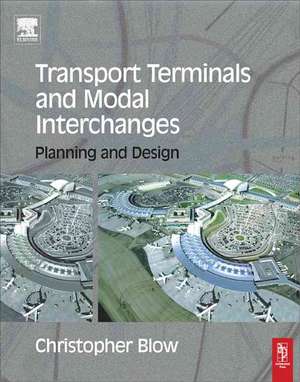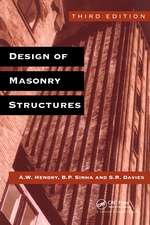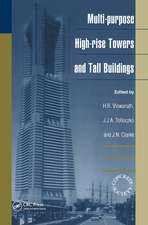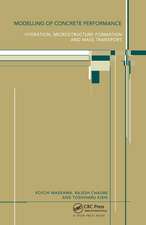Transport Terminals and Modal Interchanges
Autor Christopher Blowen Limba Engleză Paperback – 21 ian 2005
Blow takes the airport as the focal point of true multi-modal passenger terminals and presents the development of these buildings as representing a new experience in travel. The book shows that the success of the experience of transferring from one mode of transport to another depends on the many factors, including congestion in an already overloaded system, and the way that designers and managers have addressed contingency planning. International examples are drawn from areas where mobility is most concentrated and the demands on design are at their highest. The book also addresses important issues of rebuilding and redevelopment, where once separate modes of transport are being linked to each other, and where short-term inconveniences rectify past wrongs in the long term. It is a compendium of architectural and engineering achievement.
Preț: 620.08 lei
Preț vechi: 729.50 lei
-15% Nou
Puncte Express: 930
Preț estimativ în valută:
118.68€ • 123.44$ • 99.46£
118.68€ • 123.44$ • 99.46£
Carte tipărită la comandă
Livrare economică 14-28 martie
Preluare comenzi: 021 569.72.76
Specificații
ISBN-13: 9780750656931
ISBN-10: 075065693X
Pagini: 206
Ilustrații: Approx. 150 illustrations
Dimensiuni: 219 x 276 x 11 mm
Greutate: 0.64 kg
Ediția:New.
Editura: Taylor & Francis
Colecția Routledge
Locul publicării:Oxford, United Kingdom
ISBN-10: 075065693X
Pagini: 206
Ilustrații: Approx. 150 illustrations
Dimensiuni: 219 x 276 x 11 mm
Greutate: 0.64 kg
Ediția:New.
Editura: Taylor & Francis
Colecția Routledge
Locul publicării:Oxford, United Kingdom
Public țintă
Professional ReferenceCuprins
Chapter 1 Introduction; Chapter 2 History – landmarks in the twentieth century; Chapter 3 The future development of integrated transport; Chapter 4 Two particular studies point the way; Chapter 5 Twenty-first-century initiatives; Chapter 6 Taxonomy of rail, bus/coach and air transport interchanges; Chapter 7 Common standards and requirements; Chapter 8 Bus and coach interface; Chapter 9 Rail interface; Chapter 10 Airport interface; Chapter 11 Twenty-first-century trends;
Descriere
This is the first book to review a trend in transport systems which has only recently come of age: the multi-modal interchange. Separate modes of transport are being linked through 'joined-up thinking', and transport designers and authorities are only now able to exploit interchange opportunities. This book presents examples of how these new opportunities have been planned and designed, and outlines how transfer and mobility can be improved in the future.
Blow takes the airport as the focal point of true multi-modal passenger terminals and presents the development of these buildings as representing a new experience in travel. The book shows that the success of the experience of transferring from one mode of transport to another depends on the many factors, including congestion in an already overloaded system, and the way that designers and managers have addressed contingency planning. International examples are drawn from areas where mobility is most concentrated and the demands on design are at their highest. The book also addresses important issues of rebuilding and redevelopment, where once separate modes of transport are being linked to each other, and where short-term inconveniences rectify past wrongs in the long term. It is a compendium of architectural and engineering achievement.
Blow takes the airport as the focal point of true multi-modal passenger terminals and presents the development of these buildings as representing a new experience in travel. The book shows that the success of the experience of transferring from one mode of transport to another depends on the many factors, including congestion in an already overloaded system, and the way that designers and managers have addressed contingency planning. International examples are drawn from areas where mobility is most concentrated and the demands on design are at their highest. The book also addresses important issues of rebuilding and redevelopment, where once separate modes of transport are being linked to each other, and where short-term inconveniences rectify past wrongs in the long term. It is a compendium of architectural and engineering achievement.












